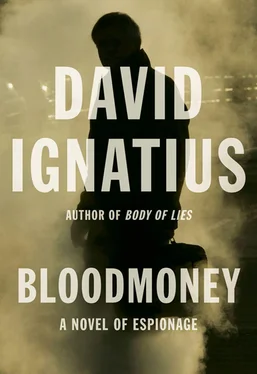David Ignatius - Bloodmoney
Здесь есть возможность читать онлайн «David Ignatius - Bloodmoney» весь текст электронной книги совершенно бесплатно (целиком полную версию без сокращений). В некоторых случаях можно слушать аудио, скачать через торрент в формате fb2 и присутствует краткое содержание. Жанр: Шпионский детектив, на английском языке. Описание произведения, (предисловие) а так же отзывы посетителей доступны на портале библиотеки ЛибКат.
- Название:Bloodmoney
- Автор:
- Жанр:
- Год:неизвестен
- ISBN:нет данных
- Рейтинг книги:4 / 5. Голосов: 1
-
Избранное:Добавить в избранное
- Отзывы:
-
Ваша оценка:
- 80
- 1
- 2
- 3
- 4
- 5
Bloodmoney: краткое содержание, описание и аннотация
Предлагаем к чтению аннотацию, описание, краткое содержание или предисловие (зависит от того, что написал сам автор книги «Bloodmoney»). Если вы не нашли необходимую информацию о книге — напишите в комментариях, мы постараемся отыскать её.
Bloodmoney — читать онлайн бесплатно полную книгу (весь текст) целиком
Ниже представлен текст книги, разбитый по страницам. Система сохранения места последней прочитанной страницы, позволяет с удобством читать онлайн бесплатно книгу «Bloodmoney», без необходимости каждый раз заново искать на чём Вы остановились. Поставьте закладку, и сможете в любой момент перейти на страницу, на которой закончили чтение.
Интервал:
Закладка:
Dr. Omar was holding office hours today at the School of Electrical Engineering and Computer Science. He was a research professor, a coveted position, since the only responsibility, other than his own work, was to supervise a few graduate students. He closed the blinds against the sun so that his office was almost dark. The whiteboard at the far end of the room, scribbled with notations and algorithms, was the only object that picked up any light.
Dr. Omar booted up his computer and waited for the screen to come alive. He didn’t do his sensitive communications here, but on another machine in the computer lab whose IP address was easier to mask. But there were puzzles he could solve in the office, too. He took off his suit jacket and put it on the hanger that hung from a hook on the door. He was neatly dressed, in a white shirt and lightweight summer suit that was the color of tobacco. His face was clean-shaven, not even a mustache, so that even with his big nose and dark complexion, he looked more Western than Pakistani.
There was a knock at Dr. Omar’s door. A young man with a scraggly beard peered into the room. His name was Tahir and he was a doctoral candidate under Dr. Omar’s supervision. His thesis topic was promising: “Traffic Analysis for Network Security using Streaming Algorithms and Learning Theory.” When it was completed, the army would probably decide to classify it, and then Tahir would be stuck, but for now he could dream.
“Excuse me, professor, I am sorry to bother you,” said the young man. He looked like he hadn’t eaten or slept in a week.
“Come in, Tahir,” said the professor, taking the student’s hand and pulling him gently into the room. “It is office hours. You are not bothering me. I belong to you today. What is it that you want?”
“I was wondering, Doctor, if you had heard from Stanford or Caltech?”
Dr. Omar had contacts in the computer-science faculties of both those schools, from his own days as prodigy in computer security. Tahir had asked for his help in arranging a postdoctoral fellowship at one of the California schools.
“I did talk to them, but I am afraid it is not good news. They cannot take you next year. They have already made commitments to people with similar research topics. Koi baat nahin, I tell you. Never mind. There will be other chances to study abroad. The university has many exchanges with China now.”
The young man shook his head sorrowfully. He did not want to go to China, but to the United States.
“What about Iowa State?” the student asked. “Or the University of Central Florida?” The National University of Science and Technology had official links with both those schools, too.
Dr. Omar laughed at the thought of little Tahir, scrawny as a she-goat, trying to make his way in the wilds of Orlando.
“We’ll try,” he said. “I don’t know anyone at either place, but I will send the abstract of your dissertation with a nice note, and you never know.”
“Thank you, professor.” The graduate student gave a little bow and backed out of the room, as if he were leaving an audience with a medieval prince.
Dr. Omar smiled as Tahir was leaving. They all wanted to go to America, these boys, even with the visa problems and the expense and everything else. The professor could understand it well enough. He had been much the same at that age, wanting to escape a world where you were bound to live with your mother until you had found a wife, who then behaved as if she were your mother, too.
Dr. Omar did not have that problem now, though it gave him no comfort. He had lost his mother nearly two years before, along with most other members of his family, and the memory was as bitter to him as if it were poison. Sometimes, when he closed his eyes, the world went white again. He did not talk about it, ever, and few people even knew of it. He had one surviving sister, who had been away with her own family on that terrible day. She lived in Peshawar, where Dr. Omar visited her occasionally and sent her money to help pay for her children’s schooling.
The professor went back to his research, waiting for the next earnest student to knock at the door. His main project these days, at least officially, was in something known as “computational neuroscience,” which focused on the algorithms of the human brain. It was hopeful and uplifting, the idea that computers could mimic the processes that took place in threads of neurons, and in that sense it was a relief from the other work that Dr. Omar hid from everyone. He had told his contacts at the Military College of Signals in Rawalpindi, who reviewed his work, that computational neuroscience was the future of warfare, because it would someday drive robots. They liked that, and approved a handsome grant.
Dr. Omar kept his hand in computer security, too, to make everyone happy. He wrote occasional papers, and did consulting abroad, and gave lectures in Rawalpindi at the MCS when they asked. His original work as a graduate student had been in a specialty known as “pseudo-randomness,” a technique that used algorithmic techniques to produce numbers that were indistinguishable, in a technical sense, from random values. Dr. Omar had always been fascinated by numbers, ever since he was a little boy in Makeen when the solutions to number puzzles used to light up in his head like the display on a carnival arcade.
It had turned out that this topic of “pseudo-randomness” was a very hot one when Dr. Omar had gotten his doctorate in the late 1990s. A team at Stanford was doing similar work, and they had invited Dr. Omar to give a paper on his research. That was how he had met the Californians, and a lot of other people, too. The visiting analysts sitting in the back of the lecture hall had studied the Pakistani’s formulas, and found uses for them that were far beyond what the young man had imagined.
Omar al-Wazir, nicknamed “the Waz” by an Indian friend he met that summer, stayed in Palo Alto for a month. He lived in a suite in the graduate student housing behind the law school, but he spent most of his time in the computer science library in the Math Wing of Memorial Hall.
When Omar went to Peet’s Coffee amp; Tea nearby, the California girls often tried to pick him up. He was tall and exotic-looking, and he had the endearing manner, even then, of a young professor. A girl named Debbie finally succeeded in taking Omar home to bed. She lived in a big California ranch house on Page Mill Road. She had the biggest breasts Omar had ever seen or could imagine. They made love every day after that until it was time for him to fly home. She said she would write, but she never did; he was a summer romance.
Omar made many other friends that month in Palo Alto, who did stay in touch and continued to ask about his research. The Pakistani authorities queried him when he returned home, but they were proud of him, too. He did some consulting for the government, and as he began to be invited to conferences abroad, he always reported back on them-not all the details, and not every conference, but enough to keep everyone satisfied. Because of his tribal upbringing and his gentle ways, Omar al-Wazir was regarded as a man above reproach.
There had been a time several years ago, before the disaster in Makeen, when the Inter-Services Intelligence had invited him-commanded him, in fact-to pay them a visit in Aabpara. They were summoning a lot of professors in those days.
He was quizzed by an unpleasant man who called himself Major Nadeem. This interrogator took him through all the byways of his life.
“Why did you go to Cadet College at Razmak?” the major had asked.
“My father sent me. He said I would be useless as a hunter or a fighter, because I was always thinking about numbers. Don’t ask me how, but I knew which ones were primes and which ones were divisible by nine, or twenty-seven, or one hundred twelve. My father decided it was a gift, although a strange one. He said I should go to a real school. Here, you can call him and ask him.”
Читать дальшеИнтервал:
Закладка:
Похожие книги на «Bloodmoney»
Представляем Вашему вниманию похожие книги на «Bloodmoney» списком для выбора. Мы отобрали схожую по названию и смыслу литературу в надежде предоставить читателям больше вариантов отыскать новые, интересные, ещё непрочитанные произведения.
Обсуждение, отзывы о книге «Bloodmoney» и просто собственные мнения читателей. Оставьте ваши комментарии, напишите, что Вы думаете о произведении, его смысле или главных героях. Укажите что конкретно понравилось, а что нет, и почему Вы так считаете.












